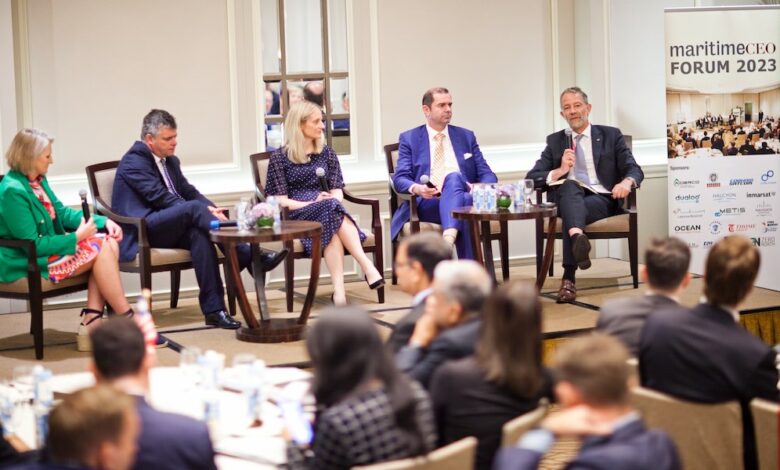Maritime CEO Forum: Tomorrow’s workforce identified

Where shipping is getting it right and wrong when it comes to attracting and retaining the best talent and how different the demands of the industry will be in the coming decade in terms of requisite skillsets made for a very lively human resources session at this week’s Maritime CEO Forum held at the Fullerton Hotel in Singapore.
Moderator Cara Carter, a director at Halcyon Recruitment, got proceedings underway warning delegates that the talent shortage the industry is currently experiencing is only set to worsen.
Sophie Smith, speaking on the day her firm was revealed to be one of Singapore’s best employers, said it was vital to be future-focused, going after Gen Z and Gen Alpha.
“If we don’t adjust our practices we will be left behind. We need to fish in different talent pools such as tech which is better at looking after young people,” said Smith, the chief human resources officer at BW Group, one of the world’s largest shipowners.
Carter said as many as 250,000 people have been laid off from the tech sector in recent months, an ideal target labour market if shipping could present itself correctly.
Mark O’Neil, president of Columbia Shipmanagement, said shipping needed to adopt “proper” human resource management.
“We talk about crew and personnel departments but this is antiquated,” the shipmanager said, urging the industry to better identify with crew, something that had improved with covid.
Better communication, and detailed, encouraging career planning were identified by O’Neill as vital. For crew, pay and packages need a relook, O’Neil said, pointing out how many seafarers do not have pension schemes or healthcare coverage in place.
Quizzed about how to make seafaring an attractive prospect going forward given all the talk of autonomous ships, John-Kaare Aune, the CEO of another shipmanager, Wallem Group, told delegates: “We get the message across that the future is human. It is about treating people with respect, giving them the opportunities and skillets to deal with the new challenges that are coming ahead.”
Ben Palmer, president of maritime at sat comms giant Inmarsat, discussed the battle shipping faces for talent. Staff want to be connected, and different skillsets will be required by shipping’s next generation, Palmer stressed.
The next generation want to believe in what they are doing, to work for a sustainable business and to use tech, Palmer said.
“Shipping has to get better at telling its story. The fierce war for talent is visceral,” Palmer said.
Quite so, agreed O’Neil. “Salary and perks don’t get people out of bed these days, it is things like ESG that do,” he said, urging the diverse maritime industry to come together with one voice rather than all the different organisations and bodies with their competing messages.
“We are telling people it is a great industry but the word is not getting out about shipping until a ship blocks the Suez Canal,” O’Neil said.
Wallem’s Aune called for a greater number of presentations to be made at schools around the world, arguing that shipping is a fascinating career path, so long as you stick with it.
“Shipping is addictive, we just need to get them into a job for a couple of years and then they will be hooked,” Aune said.
Getting them hooked however is not easy with BW’s Smith pointing to statistics from recruitment firm Faststream, which show that one-third of maritime recruits leave the industry within just 12 months.
The discussion then turned to the thorny issue of the lack of women within shipping with all panellists conceding it was a problem that has yet to be resolved.
“There are not enough women,” Smith said. “We need to expose this at forums like this to get the message across. We are determined to change this and we do need to change the narrative around diversity in the industry.”
Given the nature of the event, which is branded the Maritime CEO Forum, the discussion finished by looking at how the characteristics of shipping leadership will need to change in the coming years.
“Change is hard and there is going to be a lot of change coming up,” said Palmer from Inmarsat, adding, “Those that are successful will be the ones that develop learning cultures.”
BW’s Smith said shipping was seeing a shift from traditional leadership to more centred leadership, challenging the traditional norms of belief in terms of leadership. Vulnerability is an important characteristic of the new leader, being able to say you don’t have all the answers.
“Very small shifts in how we respond as leaders will create a shadow throughout an entire organisation,” Smith observed.
The next event in the Maritime CEO Forum series takes place at the Monaco Yacht Club in October.


Fine words. Root vegetables and dairy cattle don’t grow in Singapore, so no need to worry about whether any parsnips get buttered.
Is this shortage mainly in Singapore?
“Salary and perks don’t get people out of bed these days, it is things like ESG that do”
Haha. So i see again excuse not to raise well earned salaries to seafarares. What a BS.
Only Salary and benefits can motivate people . Anything else is total nonsence.